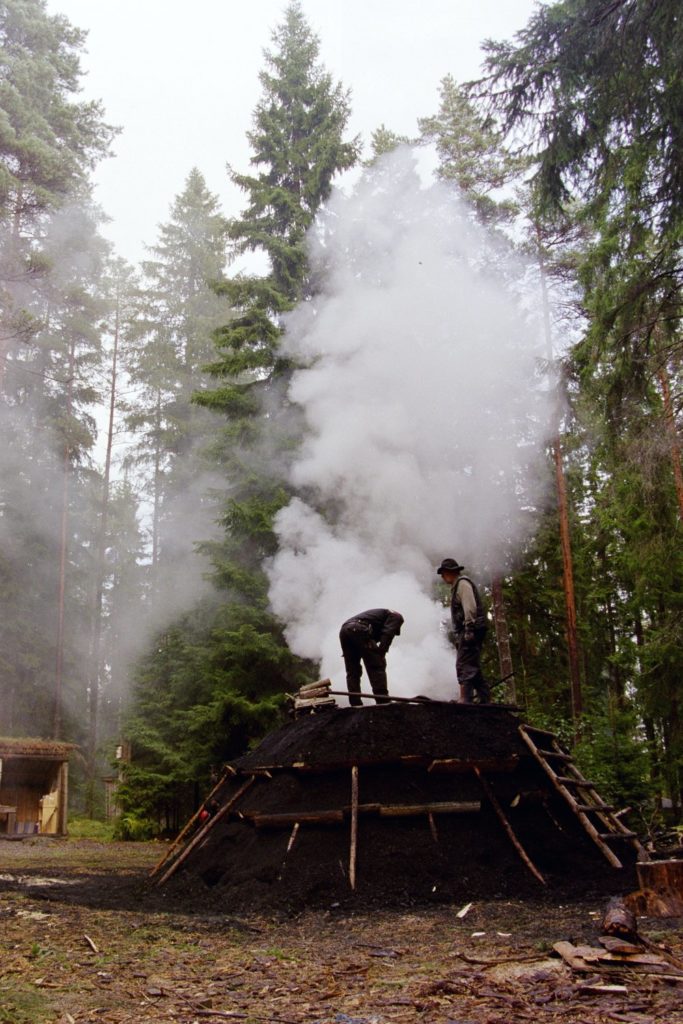The Charcoal Supply Chain

The weather is getting warm and people are grilling. It goes without saying that charcoal is a great way to cook. I’m not going to get into the debate over whether charcoal is that much better than gas, but let’s just say there’s a very long history of charcoal grilling. It still is the primary form of cooking in much of the world. If I’m going to the market stalls in Oaxaca, let’s say, that astounding food is cooked the old-school way through charcoal. The problem though is that it takes a lot of wood to make charcoal and it’s not as if the global forests can really handle this. I have seen charcoal operations in Mexico and it makes me sad, not that a few trees are cut so that people can eat, but because I can’t see this tradition really lasting all that long given the global state of forests.
So this leads us to the next question–where does your charcoal come from? Is it sustainable? The answer seems to be that no, you are pretty much burning up the tropics to make your burgers.
This charcoal produced from the receding forest at Agyana, an agrarian community on the edge of Nigeria’s capital territory Abuja, is then packaged in bags and sold to consumers all over the world for their barbecue grills, many of them unaware of the origin. It’s also in high demand locally, where urban households buy it from kiosks to cook their meals. The producers, mostly young men, invade the forests in droves in search of income. In Agyana, the charcoal producers have formed an association. The two men who fled, association chairman Gimba Abubakar explained, ran from him because they did not pay the association’s levies.
Nigeria lost nearly half of its forest area between 2007 and 2017, according to the World Bank’s Little Green Data Book. In 2017, the staggering deforestation forced environmental policymakers to recommend a de facto ban on charcoal export by ceasing to issue the permits required to produce charcoal for export legally. But the following year, with this policy still in place, other countries’ import of Nigerian charcoal grew by 34 percent, according to Comtrade, the United Nations export and import database. Charcoal use for pleasure, rather than subsistence, seems to be increasing: In 2020, the United States alone imported over 158 million kilograms of charcoal from various countries, 42 percent more than in 2019 and more than twice the amount a decade ago, in 2010.
Africa accounted for about two-thirds of global wood charcoal production in 2018, with dire consequences for the continent’s carbon-absorbing forests. Deforestation is frequently blamed on local dependence on wood fuels, in addition to land cleared for farming, timber, and construction. But there is also another factor: illicit charcoal export to countries in Europe and North America with abundant modern energy sources, consuming charcoal for leisure and novelty. And because illicit charcoal export is hard to track, very little is known about the extent of the issue.
In 2014, Nigeria started requiring charcoal exporters to obtain a permit from the Federal Department of Forestry by submitting, among other things, a reforestation plan for their area of production. But rampant deforestation continued, hence the 2017 decision to stop issuing permits entirely. The 2017 policy shift doesn’t seem to have had the desired effect either. Nigerian official charcoal export figures don’t match international charcoal import figures: According to U.N. Comtrade, countries around the world reported importing more than $91 million worth of Nigerian charcoal in 2018 alone and more than $80 million in 2019, while the country reported just $4.5 million of charcoal export in 2018 and about half that amount in 2019.
There’s some reason to believe these exports may be reaching American consumers who aren’t aware of the origins. In December 2019, for example, two years after the government stopped issuing permits for the export of charcoal, over 19,000 kg of hardwood charcoal was unloaded at the port in Miami, Florida, according to Panjiva, a subscription-based website with import and export details on commercial shipments worldwide. The port of lading was Algeciras, Spain, but the product originated in Nigeria, shipped in a 40-foot container.
A Nigerian company, Ike Godwins Business Solutions, supplied the charcoal to Florida-based Red Ember Trading, which sells hardwood charcoal to Americans. Red Ember Trading is a subsidiary of Goldengrill, a Spanish charcoal manufacturing company. Goldengrill claims on its website that its product is “made of selected woods which are processed under strict pruning control required by the environmental organizations in the Economic European Community”—a claim hard to square with Nigeria’s export ban and widespread unsustainable practices of charcoal production. Goldengrill did not respond to emails and phone calls requesting comment for this story.
There’s a lot of problems here–corruption and poverty on the African end, indifference on the American end. This is why I have argued repeatedly about the desperate needs to control supply chains and empower both workers and consumers to fight for laws and enforce those laws. It really matters where your charcoal comes from. Burning tropical forests is not OK. Know where your charcoal comes from!


